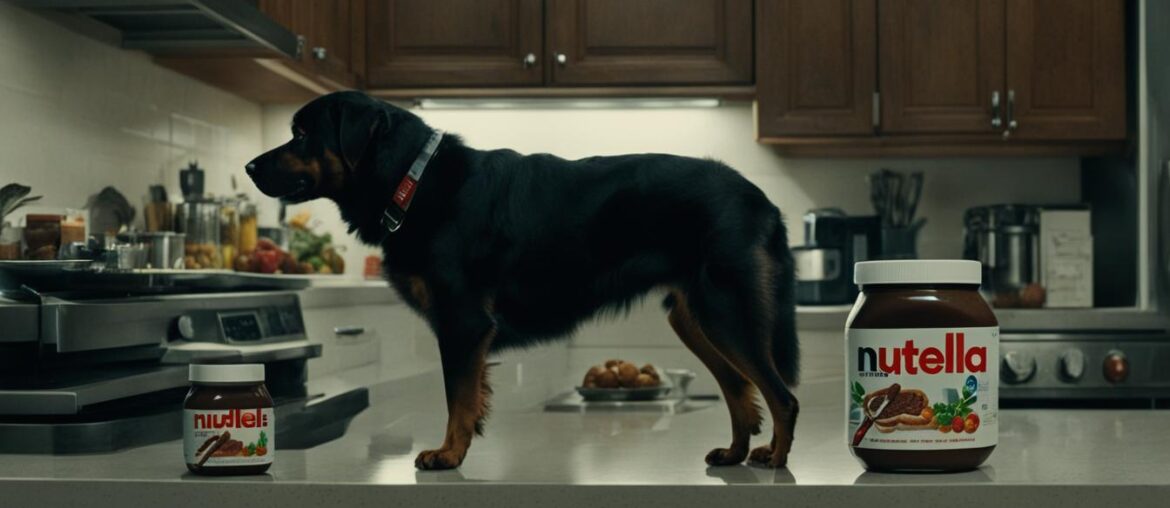As a responsible pet owner, it’s important to understand what foods are safe for our beloved dogs to consume. One notable topic of concern for many dog owners is whether Nutella, the popular hazelnut spread, is suitable for canine consumption. While Nutella may be a delicious treat for humans, it raises concerns when it comes to dogs.
It’s crucial to note that Nutella contains chocolate, which is known to be toxic to dogs. Chocolate contains theobromine, a compound that dogs cannot effectively metabolize, leading to various health issues if ingested in significant amounts. Nutella also contains sugar, which is not suitable for a dog’s diet. Even small quantities of Nutella can lead to adverse effects in dogs, including vomiting, diarrhea, increased heart rate, and potentially life-threatening symptoms.
Given the potential risks associated with Nutella consumption, it is strongly advised not to feed Nutella or any other chocolate spreads to your furry companion. To ensure your dog’s well-being, it’s best to stick to a balanced diet of high-quality dog food specifically formulated to meet their nutritional needs.
If you’d like to treat your dog to a hazelnut spread, there are dog-friendly alternatives available in the market. These alternatives are specifically formulated with safe ingredients that mimic the delicious flavor of Nutella without the harmful substances. Look for hazelnut spreads made for dogs, as they provide a safer and healthier option for your four-legged friend.
Key Takeaways:
- Chocolate, including Nutella, is toxic to dogs due to the presence of theobromine.
- Nutella contains sugar, which can be harmful to a dog’s health.
- Feeding Nutella to dogs can lead to digestive issues and potentially life-threatening symptoms.
- It is best to avoid giving dogs any chocolate spreads, including Nutella.
- There are dog-friendly hazelnut spreads available that provide a safe alternative to Nutella.
Can Dogs Eat Crab Meat?

Dogs can eat properly prepared crab meat, but there are important considerations to keep in mind. Crab meat should be prepared to human standards – all shell and skin removed, and the meat cooked all the way through. By following these preparation guidelines, you can ensure that crab meat is safe for your furry friend to enjoy.
Crab meat can be a good source of protein for dogs, which is essential for their overall health and growth. Additionally, it contains omega-3 fatty acids, which can benefit your dog’s coat, skin, and joints.
However, it’s important to note that dogs should not consume raw crab meat. Raw seafood, including crab, can contain harmful bacteria that may cause digestive issues in dogs. Therefore, it is crucial to thoroughly cook the crab meat before feeding it to your pet.
Another important precaution is to remove any crab shells before offering the meat to your dog. The shells can be sharp and potentially harm your dog’s mouth or teeth. Ensuring that the crab meat is shell-free will reduce the risk of injury.
Furthermore, refrigerated or frozen crab meat should not be given to dogs. It is best to serve the crab meat fresh and cooked. This helps maintain its nutritional value and reduces the risk of bacterial contamination.
| Benefits of Crab Meat for Dogs | Precautions for Dogs |
|---|---|
|
|
In conclusion, properly prepared crab meat can be a dog-friendly seafood option that offers nutritional benefits, including protein and omega-3 fatty acids. However, it is essential to cook the crab meat thoroughly, remove any shells, and avoid serving refrigerated or frozen crab meat to ensure your dog’s safety and well-being.
Seafood Nutrition Facts For Your Dog

Fish are valued in human diets as a strong source of omega-3 and other fatty acids or nutritional oils that the human body cannot manufacture, and they provide many of the same benefits to your dog. Fish can give your dog a more lustrous coat and solve arterial problems by balancing out their cholesterol levels; additionally, fish are a great source of protein, making them a solid choice for your dog’s muscular development.
When it comes to seafood nutrition, dogs can benefit from the high levels of omega-3 fatty acids found in certain fish species. Omega-3 fatty acids are essential for your dog’s overall health, as they promote brain function, reduce inflammation, and support a healthy coat and skin.
In addition to omega-3 fatty acids, seafood is also a great source of protein for dogs. Protein is essential for muscle development, tissue repair, and overall growth. Including seafood in your dog’s diet can help ensure they receive the necessary protein to maintain a strong and healthy physique.
However, it’s important to be aware of safe seafood options for dogs. While some types of fish are safe for dogs to consume, others may contain high levels of mercury or other contaminants that can be harmful. It’s crucial to choose fish that are low in mercury and properly cooked to eliminate any potential bacteria or parasites.
Nutritional benefits of seafood for Dogs:
- High in omega-3 fatty acids for brain function and reducing inflammation
- Excellent source of protein for muscle development and tissue repair
- Promotes a lustrous coat and healthy skin
Safe seafood options for Dogs:
| Type of Seafood | Description |
|---|---|
| Salmon | Rich in omega-3 fatty acids and protein; choose wild-caught salmon for lower mercury levels |
| Tuna | Good source of protein; opt for light tuna over albacore to minimize mercury exposure |
| Whitefish | Low in fat and high in protein; suitable for dogs with sensitive stomachs |
| Pollock | Lean fish with low mercury levels; a budget-friendly seafood option for dogs |
| Sardines | Small fish packed with omega-3 fatty acids and calcium; choose canned sardines in water |
Remember to remove all bones, skin, and seasoning before feeding seafood to your dog. It’s also recommended to consult with your veterinarian to ensure that seafood is suitable for your dog’s specific dietary needs and to determine the appropriate portion size.
Can Dogs Eat Crabs on the Beach?
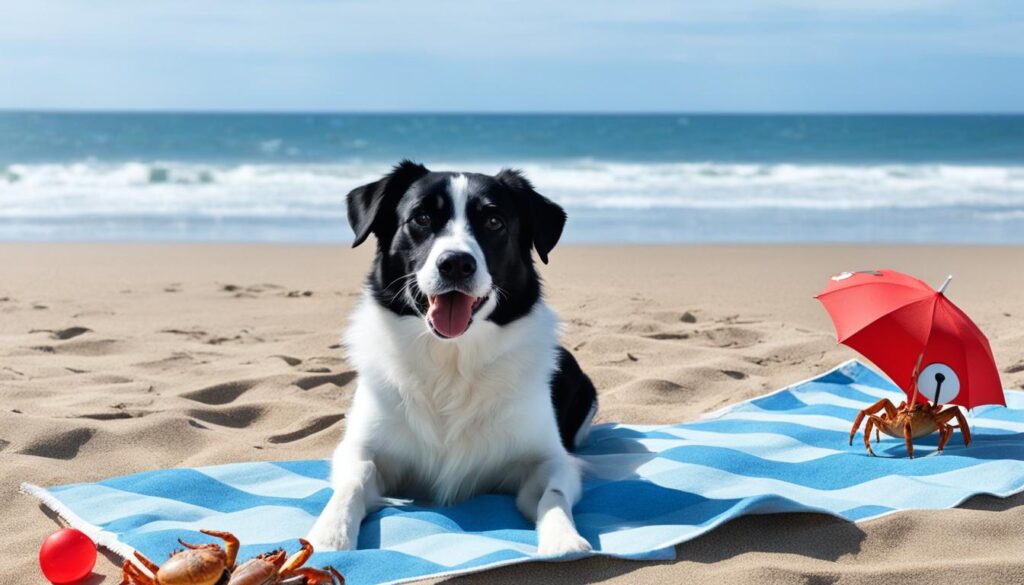
Dogs shouldn’t eat crabs on the beach for several reasons. Raw crab meat may contain harmful bacteria that can make your dog sick. Additionally, the shells of crabs are sharp and can cause injury to your dog’s mouth or teeth. It is important to keep a close eye on your dog on the beach and prevent them from eating crabs or any other potentially harmful items they may find.
When dogs roam the sandy shores, their curious nature often leads them to explore the environment, including the edible treasures they encounter. However, allowing dogs to eat crabs found on the beach can pose significant dangers to their health.
Raw crab meat can harbor harmful bacteria that may cause gastrointestinal distress or other infections in dogs. The risk of bacterial contamination is especially high in crabs found on the beach, as they may be exposed to various environmental contaminants.
Furthermore, the shells of crabs can be sharp and potentially cause injuries to a dog’s mouth or teeth if consumed. Ingesting crab shells can lead to cuts, lacerations, or even punctures in the oral cavity, which may require veterinary intervention.
While the idea of dogs enjoying a crab feast by the ocean may seem amusing, the bacterial risks and potential injuries outweigh any short-lived enjoyment. It is crucial for pet owners to keep a watchful eye on their dogs during beach outings and prevent them from consuming crabs or any other potentially harmful items.
Can Dogs Eat Crab Leg Shells?
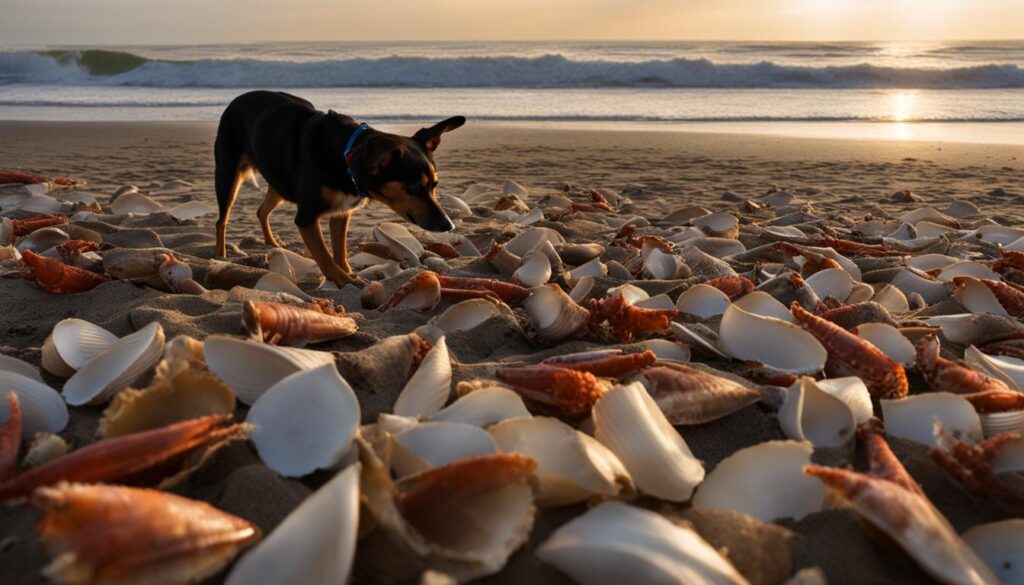
Dogs should never eat crab leg shells as they pose significant risks to their health and well-being. The sharp edges of the shells can cause injury to your dog’s mouth, throat, and digestive system. Consuming crab leg shells can lead to cuts, lacerations, or even blockages in the gastrointestinal tract, which can be life-threatening.
If you suspect that your dog has consumed part of a crab leg shell, it is essential to monitor their condition closely. Keep an eye out for signs of discomfort, such as vomiting, diarrhea, abdominal pain, or difficulty swallowing. If you notice any unusual behavior or symptoms, it is crucial to seek immediate veterinary attention.
Remember, prevention is key when it comes to keeping your dog safe from potential hazards. Ensure that crab leg shells are properly disposed of and kept out of your dog’s reach. Additionally, it’s crucial to provide your dog with a well-balanced diet that meets their nutritional needs. Consult with your veterinarian for guidance on appropriate food choices for your furry friend.
Keeping your dog safe and healthy is paramount, and avoiding the consumption of crab leg shells is one way to mitigate potential risks and ensure their well-being.
Downsides and Precautions of Crab Consumption for Dogs
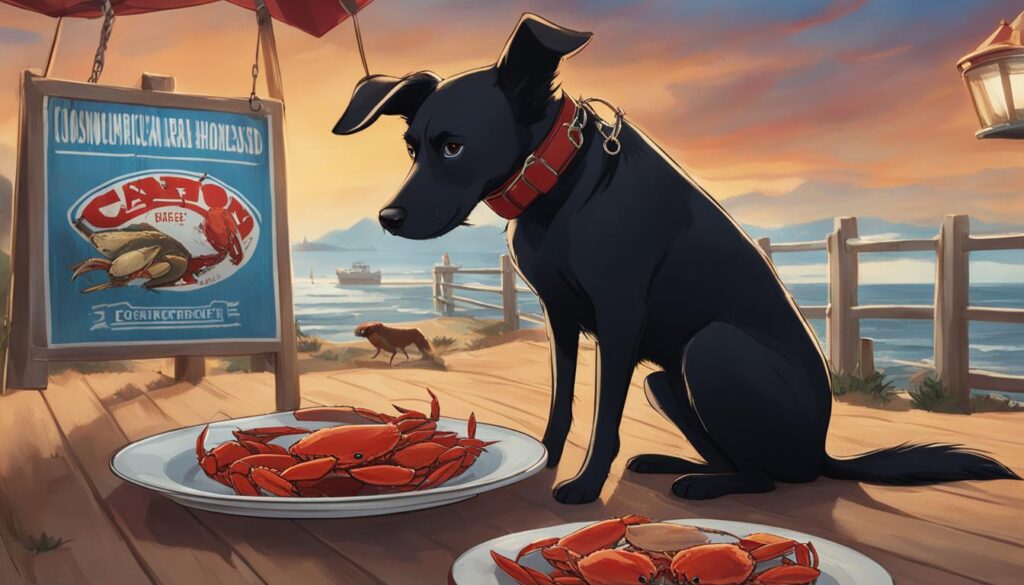
While crab meat can offer some nutritional benefits to dogs, it also carries certain downsides and risks that pet owners should be aware of. One of the main concerns is the presence of interstitial parasites inside crab meat, which can be harmful and cause severe stomachaches in dogs.
It is crucial to closely monitor your dog when they are on the beach and avoid areas where crabs are present. Dogs should not be allowed to eat crabs found on the beach, as raw crab meat may contain harmful bacteria that can make them sick. Additionally, it is important to remove any crab shells before feeding it to your dog, as the shells can be sharp and potentially harm their mouth or teeth.
Seek professional veterinary advice if you suspect that your dog has consumed crab meat. A veterinarian will be able to provide a proper checkup and necessary guidance to ensure your dog’s health and safety.
The Danger of Seafood for Dogs
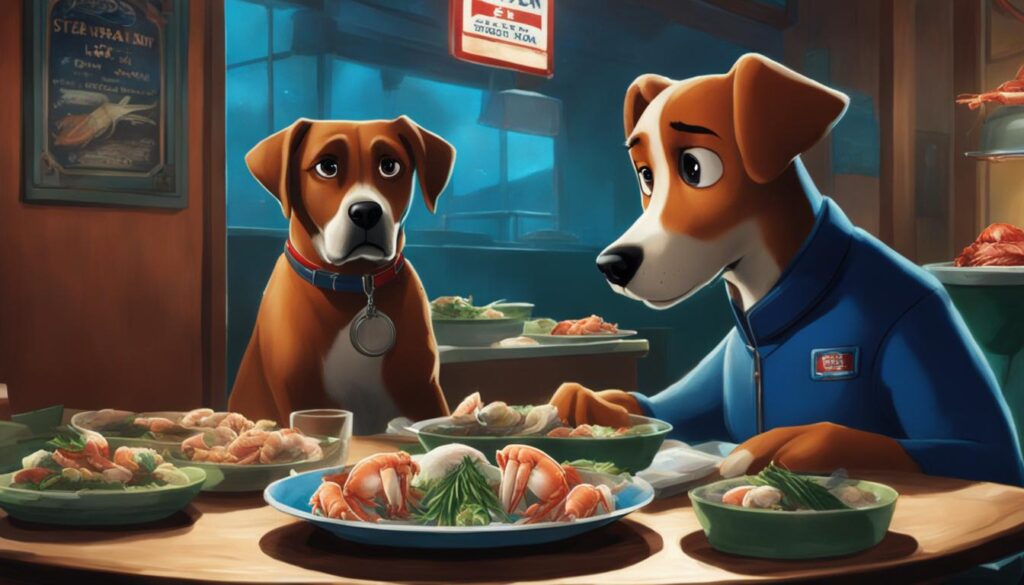
Seafood can pose significant dangers to dogs, ranging from allergic reactions to the accumulation of mercury in their bodies. It is important for pet owners to be aware of these risks and take precautions when it comes to feeding their dogs seafood.
Allergic Reactions to Seafood in Dogs
Dogs can develop severe allergic reactions to aquatic food, including various types of seafood. Common symptoms of an allergic reaction in dogs include itching, skin rashes, swelling of the face or paws, vomiting, diarrhea, and difficulty breathing. In some cases, these reactions can be life-threatening and require immediate veterinary attention.
It’s crucial to monitor your dog closely after introducing seafood into their diet. If you notice any signs of an allergic reaction, contact your veterinarian right away.
Mercury Accumulation in Seafood for Dogs
Another potential danger of feeding seafood to dogs is the accumulation of mercury in their bodies. Mercury is a toxic heavy metal that can have detrimental effects on a dog’s health, particularly their nervous system and kidneys. Fish with high mercury levels, such as tuna, swordfish, and shark, should be avoided when feeding seafood to dogs.
To minimize the risk of mercury poisoning, it is essential to limit the amount of seafood your dog consumes. Stick to low-mercury options, such as salmon or whitefish, which are generally safer for dogs.
Overall, while seafood can provide certain nutritional benefits to dogs, the potential dangers of allergic reactions and mercury accumulation should be carefully considered. It is recommended to consult with a veterinarian before introducing seafood into your dog’s diet and to monitor their reactions closely. Remember, a balanced and nutritionally appropriate diet is crucial for your furry friend’s overall well-being.
| Type of Seafood | Allergic Reactions | Mercury Levels |
|---|---|---|
| Tuna | High | High |
| Salmon | Low | Low |
| Shrimp | Low | Low |
| Crab | High | Low |
| Lobster | High | Low |
Safe Dog-Friendly Nutella Alternatives
While Nutella may be a delightful treat for humans, it is important to note that chocolate, one of its main ingredients, is known to be harmful to dogs. Theobromine, a compound present in chocolate, can lead to various health issues in dogs, including vomiting, diarrhea, increased heart rate, and even seizures. As much as we may want to share our favorite indulgence with our furry friends, their well-being should always come first.
Fortunately, there are safe alternatives available that you can offer to your dog without compromising their health. Dog-friendly chocolate spreads are specifically formulated to meet the nutritional needs of dogs, providing them with a tasty treat that is free from harmful ingredients. These spreads are carefully crafted to mimic the flavors of chocolate while eliminating the risk factors associated with traditional chocolate products. Feeding your dog a dog-friendly chocolate spread allows them to enjoy a delicious treat without exposing them to the dangers of chocolate consumption.
Furthermore, hazelnut spreads made specifically for dogs can also serve as a delicious and safe alternative to Nutella. These spreads contain a blend of high-quality ingredients, including hazelnuts, that deliver a satisfying flavor while ensuring the well-being of your canine companion. Hazelnuts themselves are safe for dogs in moderation and can provide beneficial nutrients such as healthy fats and antioxidants.
Incorporating dog-friendly chocolate spreads and hazelnut spreads into your dog’s diet allows them to indulge in a delightful treat while avoiding the potential risks associated with chocolate consumption. Always remember to check the ingredients list and choose products that are specifically labeled as safe for dogs. Prioritizing your dog’s health and well-being is essential when selecting any food or treat for them.
When introducing any new food to your dog’s diet, it is vital to do so gradually to monitor for any adverse reactions. If you have any concerns or questions regarding the suitability of a particular product for your dog, it is advisable to consult with your veterinarian for personalized advice and guidance.
Summary:
In summary, Nutella contains chocolate, which poses risks to dogs. However, there are safe alternatives available that you can provide to your furry friend. Dog-friendly chocolate spreads and hazelnut spreads made for dogs offer delicious and safe alternatives to Nutella, allowing your dog to enjoy a tasty treat without the harmful effects of chocolate. Prioritize your dog’s health by selecting products specifically formulated for their needs and always seek guidance from your veterinarian.
The Importance of a Healthy Diet for Dogs
While it may be tempting to share human foods with your dog, it is essential to prioritize their health and provide them with a balanced, nutritious diet. Dogs, just like humans, require proper nutrition to thrive and maintain optimal health.
A healthy diet for dogs consists of high-quality dog food that is specifically formulated to meet their nutritional needs. These dog foods are carefully crafted to provide the right balance of proteins, carbohydrates, vitamins, and minerals that dogs need to support their overall well-being.
Proper nutrition plays a crucial role in supporting various aspects of a dog’s health. It helps to promote healthy growth and development, maintain a strong immune system, support healthy digestion, and enhance their energy levels. A nutritious diet also contributes to a shiny coat, healthy skin, and strong teeth.
Consulting with your veterinarian is important to ensure that your dog is getting the right nutrients and that their diet is suitable for their size, breed, age, and lifestyle. They can provide personalized recommendations based on your dog’s specific needs and make adjustments if necessary.
It is important to remember that not all human foods are safe for dogs, and some can even be toxic. Certain foods, such as chocolate, grapes, onions, and avocados, can be harmful to dogs and should be avoided. Stick to feeding your dog a balanced diet of quality dog food and limit their intake of treats and table scraps.
In conclusion, providing your dog with a healthy diet is essential for their overall health and well-being. Prioritize their nutrition by choosing high-quality dog food and consulting with your veterinarian for personalized advice. By taking these steps, you can ensure that your furry friend is getting the nutrients they need to thrive.
Wrapping Up
After thoroughly examining the risks and considerations surrounding the consumption of crab meat and seafood for dogs, it is evident that proper preparation and caution are necessary. It is important to avoid feeding dogs raw crab meat or crab leg shells, as they can pose health hazards. Dogs may also be susceptible to allergic reactions and mercury accumulation associated with seafood.
To ensure the well-being of your furry friend, it is advisable to prioritize a healthy diet consisting of high-quality dog food that meets their nutritional needs. If you’re looking for a delectable alternative to Nutella, specially formulated chocolate spreads for dogs and dog-friendly hazelnut spreads can provide a safe and enjoyable treat.
When it comes to your dog’s diet, always consult with your veterinarian for personalized advice and guidance. By taking proper precautions and making informed choices, you can keep your beloved pet happy, healthy, and well-nourished.
FAQ
Can dogs eat Nutella?
No, dogs should not eat Nutella. Nutella contains chocolate, which is toxic to dogs and can cause various health issues.
Can dogs eat crab meat?
Dogs can eat properly prepared crab meat, but precautions should be taken. The crab meat should be prepared to human standards, with all shells and skin removed, and cooked thoroughly.
What are the nutritional benefits of seafood for dogs?
Seafood, including fish and crab, can provide dogs with omega-3 fatty acids, protein, and other essential nutrients. It can promote a lustrous coat and help balance cholesterol levels.
Can dogs eat crabs on the beach?
Dogs should not eat crabs on the beach. Raw crab meat may contain harmful bacteria, and the shells can be sharp and cause injury to their mouth or teeth.
Can dogs eat crab leg shells?
No, dogs should not eat crab leg shells. They can be dangerous and potentially harm your dog’s health.
What are the downsides and precautions of crab consumption for dogs?
Crabs may contain interstitial parasites that can cause stomachaches in dogs. It is important to monitor your dog closely and avoid areas where crabs are present.
What are the dangers of seafood for dogs?
Seafood can pose risks to dogs, including allergic reactions and the accumulation of mercury. It is important to limit the amount of seafood given to dogs.
Are there safe alternatives to Nutella for dogs?
Yes, there are dog-friendly chocolate spreads and hazelnut spreads available as safe alternatives to Nutella.
Why is a healthy diet important for dogs?
A healthy diet is crucial for dogs to ensure they receive the necessary nutrients for their overall health and well-being. Consult with a veterinarian for guidance on proper nutrition.
Wrapping Up
In conclusion, dogs should avoid consuming Nutella due to its chocolate content. While properly prepared crab meat can be fed to dogs, it is important to take precautions and remove shells. Seafood should be given in moderation, and a healthy, balanced diet is essential for dogs.


